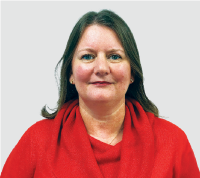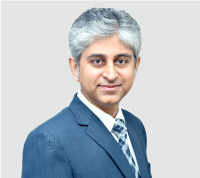
03.01
Embracing
diversity and inclusion
to foster innovation and creativity
Kathryn Martin,
Regional HR Head for MENA region

03.02
Enabling global travel through digital innovation and
unmatched
customer service
Pankaj Kohli,
Head -
Transformation

03.03
Safeguarding privacy is the responsibility
of every
stakeholder
Maria Del Rocio Avila Ramos,
Data Protection Officer
03.01
Embracing diversity and
inclusion to foster innovation and creativity

Kathryn Martin,
Regional HR Head for MENA region

We are implementing specialised career development programmes, which are designed specifically for UAE nationals. These will offer a structured pathway for skill development, leadership training, and career advancement, aligning with the unique needs and aspirations of Emirati employees.”
What are your key focus areas for Middle East and North Africa (MENA)?
Our aim is to make sure that everyone has the same great journey at VFS Global as I have had. It is to ensure that we attract, hire, and retain top talent across diverse markets with effective recruitment strategies, streamline the onboarding process, and foster talent development initiatives to support career growth and succession planning across all levels. The emphasis is on promoting an inclusive work culture that values diversity and respects local customs and traditions whilst also having fun and fulfilling our commitments.
We are compliant with local labour laws and regulations across the region, and this ensures that our HR practices align with legal standards, mitigate any potential risks, and align with operations and other business departments within VFS Global.
We will implement initiatives to enhance employee engagement, and overall well-being whilst listening to the needs of employees.
Our focus is on establishing effective performance management processes to set clear expectations, provide regular feedback, and recognise and reward high performance. Our endeavour is to support organisational change initiatives and ensure effective communication and support for employees during periods of transition.
What are the complexities in managing employee- related processes specific to MENA?
MENA comprises diverse cultures, traditions, and religious beliefs. Understanding and respecting these cultural nuances is essential for effective communication, employee engagement, and conflict resolution. Any of these may influence workplace dynamics, decision-making processes, and employee interactions. We have to navigate sensitively and adapt accordingly. We must be empathetic and connect with everyone at a personal level to see what they need and how they can contribute to VFS Global’s success.
With a multitude of languages spoken across the region, language barriers can pose challenges in communication, training, and policy dissemination. So, effective communication channels are essential to reach out to all employees.Gender roles and expectations vary across this region. Hence, it’s important to promote equal opportunities, and implement policies to prevent discrimination. Providing support to expatriate employees and their families while integrating them with our local hires is critical for us.
How do you intend to further strengthen the people-first approach, a key factor behind our success?
The emphasis is on identifying the leadership pipeline and growing the talent pool. Our focus is on fostering a sense of belonging, purpose, and pride among our employees by using recognition programmes such as ThankBank, providing them opportunities for personal and professional development, and undertaking initiatives to promote a healthy work-life balance through OneHub Well-Being.
Building a culture of trust and empowerment opens our minds to innovation, creativity, and ownership. We provide regular updates to our employees about our company’s performance and share with them strategic priorities through various communication channels. Our employee well-being programmes are paramount to VFS Global’s success. We consistently look for initiatives that support the physical, mental, and emotional well-being of our work force.
Our Learning and Organisation Development team fosters a culture of continuous learning and development, where employees are encouraged and supported to acquire new skills, expand their knowledge, and advance their careers. This includes providing opportunities for training, mentorship, and career development planning tailored to the individual’s needs.
Embracing diversity and inclusion is essential for driving innovation, creativity, and competitiveness. Our diversity and inclusion initiatives celebrate differences, eliminate biases, and create a sense of belonging among our employees. Recognising and celebrating the contributions of our employees across all levels reinforces VFS Global’s commitment to a people-first approach.
How do you propose to foster the career development of UAE nationals through the Emiritisation strategy?
Embracing diversity and inclusion is essential for driving innovation, creativity, and competitiveness. Our diversity and inclusion initiatives celebrate differences, eliminate biases, and create a sense of belonging among our employees. Recognising and celebrating the contributions of our employees across all levels reinforces VFS Global’s commitment to a people-first approach.
We also handpick mentors and coaches within the organisation who can provide guidance, support, and career advice to Emirati employees.
We provide visibility to them so that they pursue opportunities keeping in mind the long-term growth and advancement within VFS Global. We are exploring tie-ups with various educational institutions too. Our aim is to bridge the gap between academic learning and practical workforce requirements by preparing Emirati students for successful careers with VFS Global.
Earlier, you were the Regional HR Head – Europe, Russia & CIS. What are the learnings and best practices from that stint which you want to implement in your current role?
Transparent and clear communication is essential for building trust, creating engagement, and ensuring alignment across geographically dispersed teams. Operating across diverse regions requires a deep understanding of local cultures, customs, and business practices. I have learned the importance of being culturally sensitive and adaptable, tailoring HR strategies and initiatives to suit the unique needs and preferences of each country and building an effective local team where our goals are aligned to VFS Global’s needs and local law.
Successfully navigating organisational change requires careful planning, proactive communication, and stakeholder engagement. I have led change management initiatives, such as organisational restructuring, mergers, and system implementation, while minimising disruption and ensuring employee buy-in. Talent is a critical asset in driving success. I have implemented talent management strategies focused on attracting, retaining, and developing top talent within the region. This includes robust recruitment processes, personalised development plans, and succession planning to build a pipeline of future leaders. Facilitating collaboration and teamwork across diverse teams is essential. I’ve worked with regional and local teams on employee engagement initiatives.
How has your career journey been at VFS Global?
I truly feel that I have found my tribe with VFS Global. The organisation gives you room to grow but you are responsible for your own development. I have been fortunate to work with great people on interesting international projects along with regional HR teams.
03.02
Enabling global
travel through digital innovation and unmatched
customer service

Pankaj Kohli,
Head -
Transformation

Our biggest key focus area in 2024 is to provide unmatched service excellence across all applicant touchpoints including website, application journey and post submission experience.”
As per the United Nations World Tourism Organization (UNWTO), international travel is set to reach pre-pandemic levels this year. How prepared are you to handle peak season demand?
According to UNWTO, international travel is expected to reach pre-pandemic levels in 2024, with a significant recovery already observed in 2023. The economic impact of this recovery is substantial, with international tourism receipts hitting USD 1.4 trillion in 2023, about 93 per cent of the earnings in 2019.
The UNWTO also projects a 2 per cent growth above the 2019 figures. The UNWTO Tourism Confidence Index indicates a positive outlook, with 67 per cent of tourism professionals expecting better prospects for 2024 compared to 2023.
To address the demand, VFS Global has made considerable investments in ensuring smooth functioning of Visa Application Centres in 2024. Some of these include:
- Use of advanced analytics to predict applicant counts at a Mission, Country and City level for better planning.
- Build additional physical and technology infrastructure to enable business scalability.
- Strengthen our human resources with scheduled staffing and training.
- Entrust the Service Quality team with the responsibility of keeping a tab on any service deviations for quick troubleshooting and action planning.
- Bolster our customer service team to manage applicant queries across various channels including phone, email and social.
Most importantly, we are working very closely with our client governments across the globe to ensure we align with their priorities.
The last two years were challenging times for the travel industry. Based on past experiences, how do you see the situation shaping up this year?
Reflecting on the challenges between 2020-2022 and considering the increase in the demand for visas last year, we view the situation this year with cautious optimism. The COVID-19 pandemic posed challenges, including delays and reduced appointments, but the sector is adapting with new solutions aided by digital transformation to transform our market.
The 2024 outlook for international travel is broadly positive, with expectations of a return to pre- pandemic levels or even surpassing them, driven by several key factors and trends. Some factors leading to this optimism are easing of travel restrictions, rising demand for travel, technological advancement, and responsible travel.
We are, however, cognisant of a few travel sectors which may be impacted with certain regional economic conditions or geopolitical issues. So, we are approaching 2024 with a blend of optimism and preparedness, leveraging lessons learned from the past few years to navigate the anticipated rebound in travel. We are focusing on digital innovation, customer service excellence, and adaptability to changing regulations and market demands, positioning ourselves to effectively support the resurgence of global travel.
What measures have been introduced to optimise our customer response management and ensure that we can meet the high demand effectively?
We have adopted several measures to optimise our customer response management systems so that we can meet the expected high demands this year. These are designed to enhance efficiency, improve customer satisfaction, and ensure that the visa application process is smooth and seamless for applicants.
Here are some key strategies:
- Deployment of Salesforce as our global omni- channel customer engagement platform.
- Adoption of digital transformation solutions such as chatbots, digital IVRs and webforms to enable self service solutions available 24x7.
- Use of AI-based solutions to accurately predict customer contact volumes for advance planning of staff and infrastructure.
- Improved processes, basis study of our top contact drivers, including deployment of Lean Six Sigma solutions and Design Thinking.
- Enhanced reporting using Microsoft Power BI, enabling our management teams to take quick actions based on data and insights.
Finally, we have strengthened our Customer Care function which is responsible for managing all applicant escalations in a transparent and timebound manner.
What parameters are used to measure customer satisfaction?
We measure satisfaction across two key parameters:
- Voice of Customer: This relates to applicant feedback across various channels including In- VAC, contact centre and website. Last year, we received feedback from over 2.3 million people from across the globe.
- Voice of Mission: This is our bi-annual survey which is sent to various MFA (Ministry of Foreign Affairs) and regional mission personnel. Last year, we received feedback from over 2,000 personnel globally.
In 2023, we achieved our best-ever performance across both these parameters. We have a thorough approach for evaluating such feedback, which is followed by a detailed root cause analysis and action planning as required. Our desire for service excellence is inspired by Zubin Karkaria, our Founder and CEO, who is very passionate about this topic and regularly reviews performance across both these areas.
Innovation and transformation have been the key factors in our growth. What are some of the key initiatives planned for 2024?
VFS Global has been an extremely successful organisation for the last two decades by constantly redefining benchmarks in the visa outsourcing industry. We further accelerated our zeal for innovation and transformation last year as we set up a dedicated function to focus in this area. We trained over 200 staff in Lean Six Sigma globally, which provided a quantum jump in our ability to deliver such projects. We also focused on three additional domains of AI, Analytics and Digital Transformation with specialist hiring, working with domain consultants and partnering with industry leading platform providers.
In 2023, we achieved our best-ever performance across both these parameters. We have a thorough approach for evaluating such feedback, which is followed by a detailed root cause analysis and action planning as required. Our desire for service excellence is inspired by Zubin Karkaria, our Founder and CEO, who is very passionate about this topic and regularly reviews performance across both these areas.
Our biggest key focus area in 2024 is to provide unmatched service excellence across all applicant touchpoints including website, application journey and post submission experience.
03.03
Safeguarding privacy
is the responsibility of every stakeholder

Maria Del Rocio Avila Ramos,
Data
Protection Officer

Strengthening a culture of accountability involves creating an environment where VFS Global staff understand how their work aligns with the overall privacy objectives of the company.”
A privacy framework refers to a structured set of guidelines, principles, and policies that organisations adopt to manage and protect the privacy of personal information. The significance of a privacy framework for VFS Global is multifaceted to balance the protection of individual privacy rights with trust, compliance with laws, ethical conduct, and a positive business environment and can be understood from various perspectives such as:
Protection of individuals’ rights: Help safeguard the rights of individuals by ensuring that their personal information is handled responsibly and according to the law.
Legal and regulatory compliance: Many jurisdictions have enacted privacy laws and regulations to govern personal data collection, processing, and storage and we comply with these legal requirements.
Risk management: Our privacy framework assists in identifying and mitigating privacy risks associated with handling sensitive information by implementing robust privacy controls and practices.
Customer trust and confidence: Our privacy framework contributes to building and maintaining trust with our customers and client governments by being open and transparent regarding how the personal information is being handled.
Measures to protect data
VFS Global has implemented various technical measures. These include encryption measures which help us to protect data in transit thereby denying access to unauthorised individuals. We have employed robust firewall systems and intrusion detection/prevention systems. Access controls ensure that only authorised personnel have access to sensitive personal information. Data minimisation enables us to collect and retain only the minimum amount of personal information necessary for the intended purpose.
Here some of the measures that we have adopted:
Privacy by Design: Incorporating privacy considerations into the design and development of systems, processes, and solutions.
Response Plan: Having a response plan that allows us to respond promptly and effectively
Data Protection Impact Assessments (DPIAs): Conducting DPIAs helps us to assess the potential privacy risks associated with new projects, processes or systems.
Vendor Management: Ensuring that third-party vendors and service providers also adhere to high privacy standards and conducting regular Privacy Impact Assessments (PIAs) of vendors.
Culture of accountability
Strengthening a culture of accountability involves creating an environment where VFS Global staff members understand how their work aligns with the overall privacy objectives of the company. To achieve this, it’s important to consistently increase their awareness through workshops and foster open and transparent communication channels.
Safeguarding biometric data
Biometrics has added a new dimension to the debate on securing personal information. As businesses and governments increasingly adopt biometrics for authentication purposes, the ethical implications of this technology come under scrutiny. The General Data Protection Regulation (GDPR) emerges as a cornerstone in safeguarding an individual's privacy rights and ensuring the responsible handling of biometric data. Setting a global standard, GDPR emphasises transparency, accountability and lawful processing.Legal and regulatory compliance: Many jurisdictions have enacted privacy laws and regulations to govern personal data collection, processing, and storage and we comply with these legal requirements.

